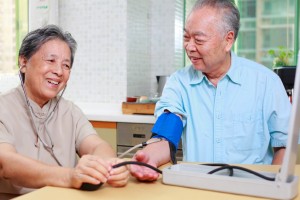What do ground squirrels and stroke victims have in common? When squirrels hibernate, they experience a drastic decrease in oxygenated blood flow to the brain, just like someone who has a stroke faces. But unlike someone who has a stroke, squirrels do not experience any sort of complications or disability because of that decreased blood flow. Scientists have been looking at these squirrels for information that may be helpful to those who have a stroke in order to help them recover with fewer lasting complications.
A team of doctors and researchers from the NIH has taken the model of the ground squirrel and have developed a drug that will potentially provide the same levels of protection that are experienced during hibernation. The drug is in the earliest stages still, but it has a lot of potential to help those who suffer from a stroke. It may even provide preventative value, depending on where future research takes this. The developments made by the NIH were recently published in The FASEB Journal.
Squirrels experience a cellular process referred to as SUMOylation when hibernating, and when this occurs, the brain is protected even though it experiences decreased oxygen levels for extended periods of time. Using this process, a drug has been developed that will hopefully provide humans with the same levels of protection.
There are also hopes that this unique approach to helping elderly individuals suffering from a stroke will breed creativity in other researchers. There are many diseases and conditions that the elderly face without an easy solution, and there’s a chance that other illnesses could be resolved with an approach like this.
Is a therapy that found its inspiration in a ground squirrel’s hibernation routines going to be helpful? It’s hard to tell at this point. However, successful treatments in other areas have come from stranger places. It makes sense that there’s something happening with a squirrel’s brain that will be helpful for humans. Whatever occurs that protects a squirrel might also be protective within a human brain. More research will be needed to know for certain.
In the meantime, when a family member suffers from a stroke, we have an obligation to help them find the appropriate care. After they are discharged from the hospital, things become a lot more complicated. In-home care might be sufficient for the people we love in many cases, but not all. Each person needs to be looked at on a case by case basis, and what works for some won’t work for everyone. Be sure to find the best care possible based upon your loved one’s unique set of needs.
If you’re not sure what this might entail, be sure to speak to a medical professional. They will let you know in greater detail what your loved one’s needs are, and then you can begin taking the appropriate steps to help them find the best senior care possible. If you have more questions regarding the best care for your specific situation, then feel free to contact us. We’ll schedule a free consultation for you and we can go into more detail on whether our care services are right for your needs.
The post Looking to Squirrels to Help Stroke Victims appeared first on Paradise In-Home Care.

No comments:
Post a Comment